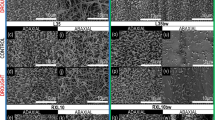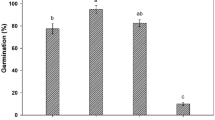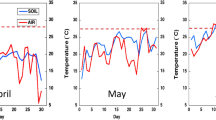Abstract
ALTHOUGH the effect of low terhperature in inducing vernalization is now well established, it is by no means clear to what this effect is due. It appeared possible that the mere check in growth at low temperature is the chief factor. The results of Vasiljev1, which showed that when the period of low temperature treatment is included the time taken to flower remains nearly constant, lends support to this view.
This is a preview of subscription content, access via your institution
Access options
Subscribe to this journal
Receive 51 print issues and online access
$199.00 per year
only $3.90 per issue
Buy this article
- Purchase on Springer Link
- Instant access to full article PDF
Prices may be subject to local taxes which are calculated during checkout
Similar content being viewed by others
References
I. M. Vasiljev (1934). Quoted as reference No. 28 in N. I. Maximov, ” The Theoretical Significance of Vernalisation”, I.A.B. Herbage Publication Series, Bull. 16, Dec. 1934.
ibid., p. 8.
Author information
Authors and Affiliations
Rights and permissions
About this article
Cite this article
GREGORY, F., PURVIS, O. Devernalization of Winter Rye by High Temperature. Nature 138, 1013–1014 (1936). https://doi.org/10.1038/1381013b0
Published:
Issue Date:
DOI: https://doi.org/10.1038/1381013b0
This article is cited by
-
Vernalization and the growth-phase concept
The Botanical Review (1940)
-
Devernalization of Spring Rye by Anærobic Conditions and Revernalisation by Low Temperature
Nature (1937)
Comments
By submitting a comment you agree to abide by our Terms and Community Guidelines. If you find something abusive or that does not comply with our terms or guidelines please flag it as inappropriate.



